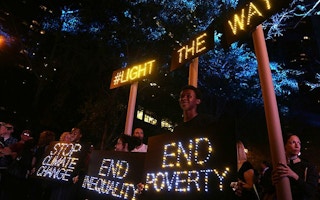Ours is an age of abundant knowledge. The scientific community has leveraged the connectivity of modern technologies to rapidly spread messages across the world and open new spheres of inquiry. Among other things, this has enabled scientists to forecast climate trends over the decades ahead. The quest for sustainable development will not fail due to lack of knowledge but rather lack of action.
Translating knowledge into action is, however, no easy task. Spinning theories is one thing; putting hard-won insights into practice is another.
This is especially evident in the case of climate change. The United Nations’ 2030 Agenda for Sustainable Development has given us a road map for moving from knowledge to action in the form of the 17 Sustainable Development Goals (SDGs).
The SDGs have proven beneficial, but they also pose complex and demanding challenges. Not enough has happened to implement them. Concrete actions are rare. Effective pathways are still missing—and people are taking to the streets to protest because politicians are not responding with urgency.
The results of the European elections last May reveal a growing desire among Europeans, and especially younger people, for more and better measures to protect the environment and for a swifter transition toward a more sustainable society.
At the same time, populations in mining districts are fearful of what the future might bring and are fighting to protect fossil energy industries. How should we, as a society, deal with these conflicts?
The how, when and why of all these issues has been the focus of 17 sustainability scientists who came together at the first Global Sustainability Strategy Forum (GSSF) held in Potsdam, Germany, in March 2019. The group was composed of people—including me—from six continents and 12 nations from the natural sciences, social sciences and humanities, all striving to figure out how to change our existing strategies to better achieve the SDGs.
“
Effective pathways are still missing—and people are taking to the streets to protest because politicians are not responding with urgency.
Here’s what we came up with:
1. Take it step by step
Rather than focusing on long-term objectives and waiting for a turning point that might never come, we need to set our sights on feasible near-future goals and take small steps to achieve them.
There is a tendency in policymaking to postulate very ambitious goals for the far future to compensate for lack of action in the present. This allows us to avoid unpopular decisions but still give the impatient audience the assurance that something drastic will be done in the future.
To actually achieve the SDGs, we should be making plans to run short sprints in the coming years rather than constantly revising our training schedule for an ultramarathon that will last well into the middle of this century.
Step-by-step progress unfolds as a process of continuous and dynamic learning. What has been achieved? Where are new conflicts arising? How can unintended side effects be cushioned? By taking small steps continuously and persistently, we will get closer and closer to reaching our ultimate destination.
2. Think regional, not global
Similarly, we must begin to think in terms of regional rather than global contexts. A global scope is too abstract. It slows processes and saps momentum. Global actions take time in a weak global governance system and, even more important, do not take into account the special regional conditions and contexts that need to be considered when actions need to be effective.
3. Strategically balance conflicting objectives
Measures that benefit the environment do not necessarily offer economic, social or cultural benefits. Nevertheless, the preservation of the ecological foundations of life is a prerequisite for the implementation of economic and social goals and must be prioritised. We need to keep conflicting policy objectives in our sights and make sure we strive for the most critical first, but at the least expense to others.
Of course, every policy in a situation of conflicting values and objectives faces painful trade-offs. There will be winners and losers. But the benefits of transformation must extend to those affected by loss. A society built on the principle of solidarity does not abandon its citizens.
4. Work from the bottom up
Transformations toward sustainability cannot be imposed from above, prescribed by scientists, or squeezed out of society by nongovernmental organisations. They must be initiated and implemented by the very people who will experience their effects—individually and collectively—in the social and cultural contexts in which they live and work.
Throughout an iterative process of learning and change, science can offer valuable guidance and assess the possible effects and side-effects of measures in advance. But it cannot simply prescribe solutions. Those affected are best placed to do so.
They need help, of course—the challenges we face are complex and difficult to understand. But they also need to be in the drivers’ seat, not participating as passive passengers.
5. Use stories to drive change
Science matters, but stories matter as much because they carry the science to the people who can use it. Scientific findings and models play an important role in telling us what we need to do, but that will be the end of the story unless we develop narratives together with those affected and then integrate these narratives within the policymaking process.
People ask themselves why they should change their lives and why they should go through the pain of continuous learning and adapting their lifestyles. Abstract models, whatever their scientific value, cannot provide satisfactory answers. The answers that people need to hear are woven—implicitly and often explicitly—within narratives.
Such narratives are particularly effective when they are told not as tales of cataclysmic horror but as stories of opportunity that portray a better and fulfilling future for all, in which ecological, economic and social concerns can indeed be reconciled.
Next steps
The key message to emerge from this year’s GSSF is: We can’t wait for a global revolution.
Instead, we must begin today by taking action, step by step and around the world, to preserve the foundations of life for all. And we must do so in a way that is led by the people who are affected. Science should not pretend to have all of the answers.
Instead, it should facilitate and support the development of narratives that promise a future that is meaningful and affords everyone a high quality of life within their respective cultural context.
A second forum will take place in 2020 and focus on the regional impacts of the SDGs. How can policymakers and practitioners take different economic, cultural, institutional, historical, social and geographical circumstances into account as they work toward achieving these goals? And how can we advance the implementation of sustainable development strategies?
By focusing on regional implementation we are not abandoning the global perspective. We are “thinking locally and acting locally” in awareness of the global impacts in a world in which all the spheres of life are interconnected.
Ortwin Renn is managing scientific director at the International Institute for Advanced Sustainability Studies (IASS). This article was originally published on Ensia.











